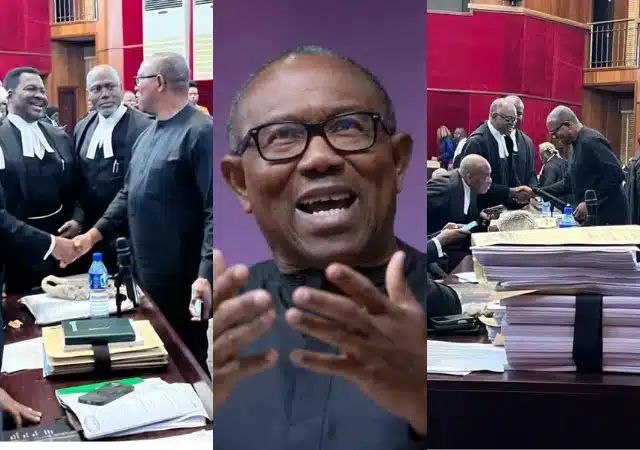Nigerian opposition leader Peter Obi, who came third in February’s presidential election, has acknowledged that his legal battle to overturn the result is over.
His attempt, alongside second-placed candidate Atiku Abubakar, to annul Bola Tinubu’s victory failed in the Supreme Court last month.
In a unanimous ruling, judges dismissed his claim of widespread rigging.
The ruling was a “total breach of confidence”, Mr Obi said.
The presidency swiftly dismissed his remarks as “false narratives”.
Mr Obi, who is the leader of the Labour Party, told journalists in the capital, Abuja, that despite the unanimous judgement his dream for a new Nigeria had not ended.
In February’s election, which was the most fiercely contested since the end of military rule in 1999, he had been seen as the candidate who represented the hopes of some young people.
His run for the presidency was an attempt to break the dominance of the two parties which had governed Nigeria for more than two decades.
Mr Tinubu won the election with 37% of votes cast, against former Vice-President Mr Abubakar’s 29% and 25% for Mr Obi.
The two main opposition candidates had sought to reverse the presidential election, alleging it was marred by irregularities and that Mr Tinubu was not qualified to seek or hold the presidency.
In September, the Election Petition Court upheld Mr Tinubu’s victory and the opposition then appealed to Nigeria’s highest court.
But the Supreme Court said that the opposition challenges had “no merit”.
The electoral dispute had put Africa’s most populous country on the edge after the general election.
Reacting to the judgement on Monday, Mr Obi said the verdict damaged the confidence Nigerians have in the judiciary.
The former Anambra state governor rejected the judgement, saying it contradicted the “overwhelming evidence of rigging” presented before the court.
He described that evidence as “hefty allegations” which should not be treated with levity.
The 62-year-old politician, who addressed the media alongside his running-mate, Datti Baba-Ahmed, did not explicitly disclose whether he would run for president again in 2027, but he said the end has not come for his journey for a new Nigeria.
“As a party and as candidates, Datti and I have now exhausted all legal and constitutional remedies available to us,” Mr Obi said, describing the Supreme Court’s judgement as another beginning in “our quest for a better country”.
“We shall now expand the confines of our message of hope to the rest of the country,” he added.
But in a swift response, Bayo Onanuga, a presidential aide, described Mr Obi’s remarks against the court verdict as “false claims and innuendos”.
Mr Onanuga said the Labour Party leader, having admitted that the Supreme Court ruling brought an end to the presidential poll litigation, should now congratulate President Tinubu and pledge his support in the spirit of statesmanship.
Reacting to the court verdict last week, Mr Abubakar, the Peoples Democratic Party leader, said the ruling “doomed” the country’s democracy and politics.
President Tinubu, who was the candidate of the All Progressives Congress, lauded the ruling.
BBC


